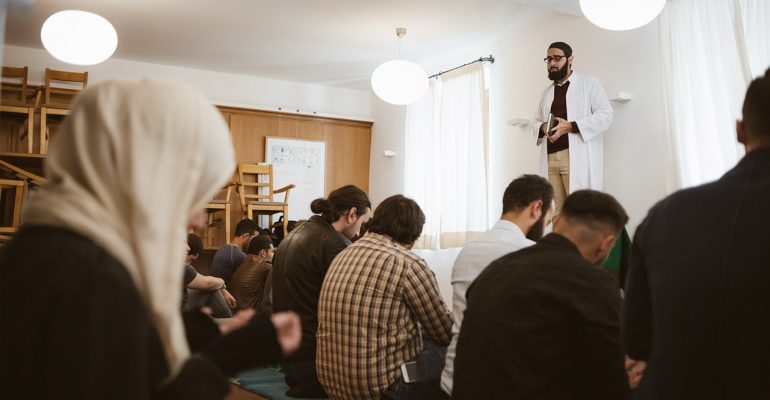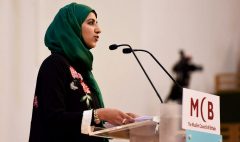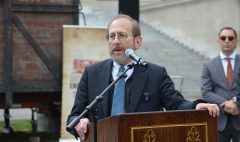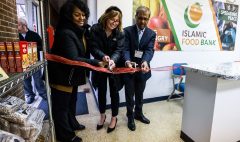No place to pray; Munich’s Muslims are turning to old pubs and churches
October 11, 2017 2023-07-10 11:27No place to pray; Munich’s Muslims are turning to old pubs and churches

No place to pray; Munich’s Muslims are turning to old pubs and churches
The sound of Muslim prayer drifts out from the old pub onto the street, as men and women inside kneel on rugs laid down carefully minutes earlier. This is no ordinary congregation, and no ordinary place of worship. Since May, this community of liberal Muslims in Munich has been nomadic, seeking a new space to hold their Friday prayers each week.
Today a charitable foundation has lent them a meeting room in a former pub. But they have no idea where they will pray next. In the building next door, a mosque stands empty in the Munich Forum for Islam (MFI), an organization set up in 2014 to promote a modern, European form of Islam. The mosque here was forced to close down earlier this year because of overcrowding. City council spokesman Stefan Hauf tells CNN that fire regulations were being breached because of the large number of people trying to enter.
“People were praying outside on the street,” Imam Ahmad Popal, 27, says. “We locked the door but they were climbing in through the windows.”
“For us Muslims, the mosque is a place where we come together, a place where we learn, a place where we find inner peace,” he says. “When we don’t have a mosque, we don’t have that place.”
There have been no open mosques in downtown Munich since May, when the MFI mosque was shut down. Five other mosques in the city center were closed in the months before that, some as a result of overcrowding, others because the tenants were forced to leave after landlords declined to renew their rental agreements.
The absence of mosques is especially inconvenient on Fridays, when Muslims are supposed to come together at lunchtime to pray. Muslims working or studying in central Munich don’t have time to travel to mosques in the suburbs that have managed to stay open. Most of the remaining mosques in the city are small, and associated with particular cultural or ethnic groups whose imams usually preach in their own language. Over the past four months, Popal’s congregation has had no luck in its search for a permanent home. Several applications were rejected “as soon as they heard the word mosque,” says Popal, adding: “People want to have nothing to do with that.”
A week after the MFI mosque was closed, the congregation made plans to hold Friday prayers in Marienplatz, Munich’s central square, outside the city hall, but cancelled them after being threatened by right-wing groups.
“There were personal threats against my family, against me, against the community,” Popal says. “They threatened to throw pork at us, urine and blood, too.”
“I never wanted to provoke anyone,” he recalls. “I never wanted to protest. I just wanted to make the people of Munich aware of the problem we were facing.”
When he learned of the congregation’s plight, Karl Kern, the priest of a Jesuit church nearby, offered them a room to pray in.
“When there are people who want to pray, God-fearing people must stand with them and help them. That’s obvious to me,” says Kern.
By opening his doors, he also sent a message: Muslims are welcome in this city.
Churches, theaters and cultural institutions across Munich have since followed Kern’s lead. While Popal and Inan are deeply thankful, there’s still no permanent solution in sight.
Between 2011 and 2015, 1.2 million Muslims arrived in Germany, many of them refugees from Syria, Afghanistan and Iraq. Muslims now make up around 5.5% of the population nationwide. This growth increases the risk of overcrowding in mosques across the country. And although many of Germany’s Muslims are well integrated — 96% say they feel closely connected to the country, according to a recent report by an independent think tank — they are not yet fully accepted.
The same report found that 19% of Germans say they don’t want a Muslim as their neighbor. The lack of mosques is not unique to Munich, but it is most acute here, explains Aiman Mazyek, chairman of the Central Council of Muslims in Germany, one of several national umbrella organizations representing Muslim groups. Munich is a politically conservative city with strong Christian traditions — there are 13 churches in the city center alone. Since the beginning of 2015, more than 160,000 asylum seekers, many of them Muslims, have arrived here. Across the country, mosques are being closed and communities are struggling to find spaces to pray. Popal believes there is a particular need for his take on Islam — one where men and women pray side by side, where the imam preaches in German, rather than Arabic, Turkish or Persian, and where liberal European values hold sway.
Source: CNN








